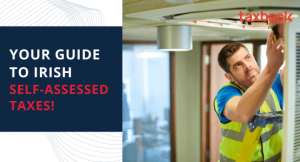How do I Claim the Home Carer’s Tax Credit?
The Home Carer’s Tax Credit is nothing to sniff at, especially since it was increased in Budget 2020 to €1,600.
Married or in a civil partnership and jointly assessed for tax purposes? You may be able to claim the Home Carer's Tax Credit if you stay at home to mind the kids.
So why aren't people claiming it? According to a recent poll, it's one of the top 5 tax reliefs that people are entitled to that are not being claimed. In a survey we ran recently where we asked respondents 'do you know what the Home Carer's Tax Credit is?' Over 60% responded 'No'.
In fact tens of thousands may be missing out on the extra income. One answer to this may be because some people are unaware of the credit or if it applies to them.
Thousands of householders in Ireland could benefit from the scheme but just don't claim it.

So, who is it for?
The credit is available to those who care for a dependent in their own home. It is awarded to an individual who is married or in a civil partnership that is jointly assessed for tax purposes. So for example, if you get married and you have child but one of you decides to stay home to look after that child, then you should find out if you qualify.
A 'dependent' in this case is:
- A child who qualifies for child benefit
- Person aged 65 or over
- Person with physical/mental disability requiring care
- Relative by marriage or someone for whom you are legal guardian
So, for example, if you're married and you choose to stay at home to look after your child in your own home, then you should apply for the tax credit.
How much will I get?
The government increased the value of this credit for 2020 to €1,600 in this year's Budget.
There are different rates depending on what the home carer earns. If the home carer's income is less than €5,080, they will be entitled to the full tax credit of €810 (2015). If the carer's income is less than €7,200, then you're entitled to the full tax credit of €1,000 (2016), €1,100 (2017), €1,200 (2018) and €1,500 (2019). If the carer's income is between €5,080 - €6,700 (2015), €7,200 - €9,200 (2016), €7,200 - €9,400 (2017), €7,200 - €9,600 (2018) and €7,200 - €10,200 (2019), they will get a reduced relief. However, if the carer's income is over these amounts, then no credit will be due.
So, based on the minimum wage, you can work on average 15 hours per week and still be entitled to the home carer's credit.
Can I claim both the credit and the increased standard rate band for dual income couples?
No but you can claim whichever is most beneficial to you.
If I'm granted the home carer's credit one year but exceed the €10,200 the next year, can I still avail of the credit in that year?
The tax credit will still be granted for that year if:
- The other conditions for the tax credit are met, and
- The credit was granted for the immediately preceding year
When do I need to claim?
You must make a claim for the credit within 4 years after the end of the tax year to which your claim relates.
So, for example claims for 2015 must be made by 31 December 2019.
How to claim?
Firstly, you can find out if you're owed the credit by applying for a free four year refund assessment here.
We'll tell you if you can claim and also if it is the most beneficial tax treatment for you.
Remember if the below applies to you:
- You’re married/in a civil partnership and jointly assessed for tax
- One spouse/civil partner works in the home caring for one or more dependents (can work part-time)
- The home carer’s income is less than €5,080 (2015) or €7,200 (2016-2019) (reduced tax credit if income is slightly over these amounts).
Then you should apply with Taxback.com today!
Or if you're still confused by PAYE taxes, you should download our PAYE guide straight to your desktop or phone below.




